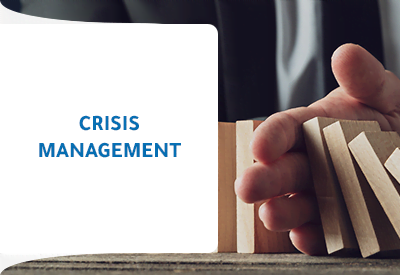None of us ever expected that the whole world would be brought to a halt as a result of a World Crisis, aka the COVID-19. With the world literally in a halt many businesses closed shop and hard-working employees were left without a Job.
How and when the world will revert to normal remains unknown, although things are starting to get better you never know what the future holds. Here are some Statics about the past period that reflects the halting Effect of the Corona Virus:
- According to a report by the U.S Chamber of Commerce, in every sector & region of the country, one of Four small businesses. Almost 24% have already temporarily closed, 40% reported that they might do so in the next two weeks.
- 43% believe they have less than 6 months before their business closes for good.
With all that in mind the best offence is a good defense and the best way to prepare for the future, we decided to write a piece on crisis management and how to turn crisis situations into a massive break, for you, your company and your employees.
1) Best Practices of Crisis Management
- Prepare a Crisis Management Plan
As the saying goes, the best offence is a good defense, and the best methods of pre crisis management is to have a crisis management plan ready in case of the occurrence of a potential crises.
The crisis management plan does not have to cover every single detail in the crisis management process, but its a good idea to have it cover some of its main elements in the event of a negative event or the event of a crisis no matter what the type of crises at hand.
A crisis management plan should include the individuals of the different crisis management teams, crisis teams. Post crisis & pre crisi procedures among other elements.
- Build an unstoppable team
The core and backbone of any successful company or entity for that matter are its people or members. Gone are the days that employees were considered more than just foot soldier or grinders.
This means that their productivity, development and improvement are where you should be investing as in the times of a crisis that’s what you will be banking on.
Another aspect of your team’s well being you should also put in mind is how they are coping as individuals. This period, similar to any crisis period, is straining both financially and emotionally.
- Be Financially smart
Usually, in times of Crisis, finances are short, that’s why it’s crucial to survive such troublesome times is to be financially smart.
Being financially smart is not just about cutting unnecessary costs it’s also about finding new streams of revenue. Cutting unnecessary costs may be as simple as Switching to a remote work format to save on rent and working expenses to stopping acquisition of new equipment
As for generating new revenue streams or sources of income, the main places you would be looking to save some cash would be Price, Volume, Cost of goods sold, overheads, accounts payable, accounts receivable, inventory & accounts payable.
- Retain and Empathize with your Customers
It’s no secret that during times of crisis consumers or individuals, same as you’re trying to cut your losses so are they. This makes the customers that stick around with you during these tough times the most valuable customers you have.
These customers might be loyal to your brand because of a good online experience, a well-delivered purchase or any other reason, that does not mean however that they don’t expect to be rewarded.
Maintaining this customer base during a crisis time requires a health CRM (Customer Relations Management) and an empathetic approach to their needs.
Observe what they need during this period and provide them with services, products, advice or even content on what they need the most and stay in touch with them.
- Learn to Adapt & Pivot
If the current crisis we are going through has taught us anything, it’s that the key to survival is adaptation.
The value a business aims to provide via its products or services is inherently connected with the value their customer is looking for.
An example of how some businesses were able not just to avoid financial crises during this crisis but capitalize on it, as per impactbnd.com, were Pizza Hut, Papa Jones & Doordash to name a few.
What were these brands doing differently through?. Well, they listened to their customers and provided solutions for them based on their needs.
- Papa Johns created a full touch less delivery experience for its customers.
- Domino’s went a step further and created Custom Drop-Offs allowing customers to pick up their pizzas wherever they may please.
- Focus on Growth & Innovation
With the slowdown of conversions and purchases in most industries, it may be a good time to reflect and see what growth opportunities there are out there.
I know it’s hard to look at the glass half-full side of the equation but this time although not filled with sales or revenue it’s filled with chances to observe and arm yourself adequate for the post COVID-19 stage.
This focus on growth and innovation does not necessarily have to happen overnight. It might not even occur within the first months or two but it’s important to plant the seed of that line of thought and start building a culture for it.
So basically reflect, ideate and test out your assumptions and embrace new and innovative ideas & fail Fast and Cheap.
- Strengthen your firm with good leadership
Since one of your priorities is sustaining the emotions and mental well being of your employees so should be making sure that they are led by strong experienced leaders, not managers.
The distinction between being a manager & being a leader is that the latter leads by example, inspiring his team, empathizing with them & motivating them, constantly improving himself & leading by example. While the first leads by the sheer authority of his title.
Another point to consider when choosing which leaders to keep around is how adaptable they are to a remote working environment. You might think that it’s the same thing as managing while people were back in the office but it’s not.
- Be Honest and Take Responsibility
Our first instinct even as individuals when something dangerous our way or when we do something wrong is to escape the results and preferably not own our mistakes. The complete opposite should be your instinct as soon as your business faces a crisis.
Customers respect when their favorite brands are honest and level with them, as log as their ownership of their mistakes or if the crisis is due to a mistake by the hands of the company. They expect to see genuine actions and steps being taken to rectify the damage and make them feel safe
So in short, be honest with your staff, your partners & your customers and do actual steps to resolve the problem not just keep face and sell false hope.
2) Study Cases
Those were some of the best practices and things to consider while managing your business in crisis mode. Since what was done once can be done again we decided to share with you some real-life cases of businesses that achieved an amazing turnover out of a crisis and some who didn’t.
- Toyota:
For years, Toyota won market share & customers form the U.S car manufacturers in their market and its brand was synonymous with quality.
This was the case until they had to recall millions of vehicles due to a problem with their sticky accelerators and sacrificing its customer-centric core values for it becoming the largest automaker
Toyota’s response was slow on both ends aka its apology and recognition of the issue & in resolving the technical issue and figuring out where the technical problem was, losing what it had built over the years.
- Johnson & Johnson:
Back in the early 1980’s Johnson & Johnson faced one of its most tiring crises & industrial accidents, when several Tylenol Capsules were laced with cyanide, a highly deadly substance, that resulted in a loss of many lives.
Sticking to its customer-centric approach and with apparently no concern for financials. They used the media coverage to alert the public of the dangers of the substance, dispatched their scientists to figure out the source of the tampering and started an aggressive campaign to rebuild its brand.
The outcome of Johnson’s honesty, integrity and leadership led to it not only retaining its original market share but increasing it in a couple of months after the accident.
In conclusion from the two examples mentioned before its clear which is the best way to manage a crisis and how handling it right could yield great Outcomes. So next time your firm is in crisis just calm down, take it easy and follow the steps above.
Featured Articles:


